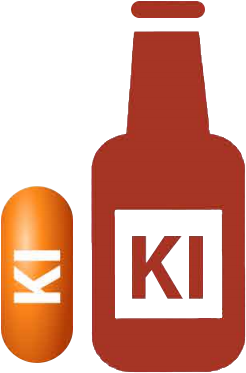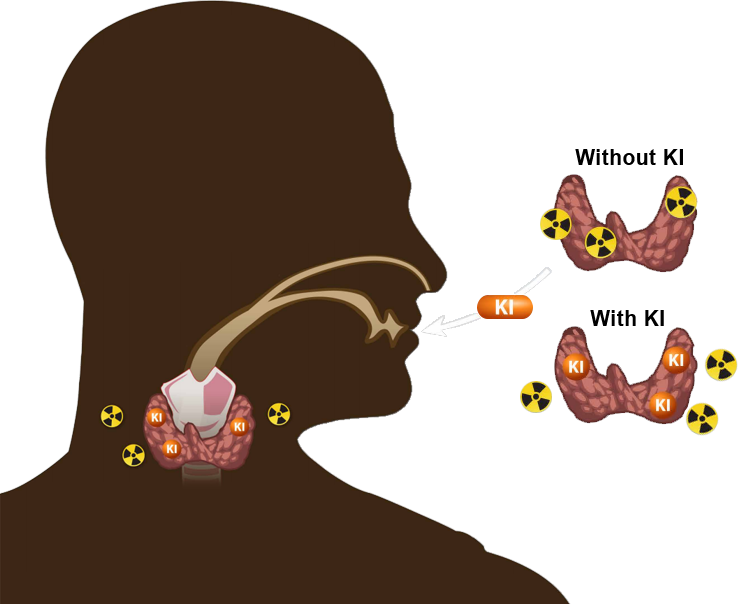Key points
- In a radiation emergency, some people may be told to take potassium iodide (KI) to protect their thyroid.
- Do not take KI unless instructed by public health or emergency response officials or a healthcare provider.
- KI is recommended only for people under 40 and women who are pregnant or breastfeeding.
- KI can have harmful effects when used incorrectly. Only use KI products that are approved by the U.S. FDA.

Potassium iodide (KI)
Potassium iodide (KI) is a type of iodine that is not radioactive. It can be used to help block one type of radioactive material, radioactive iodine, from being absorbed by the thyroid.
In some radiation emergencies, radioactive iodine may be released into the environment and enter the body through breathing or eating. This is known as internal contamination.
The thyroid is a gland in the neck that plays an important role in many body functions. When the thyroid absorbs high levels of radioactive iodine, it can increase the risk of thyroid cancer many years after exposure in infants, children, and young adults.
How KI protects the thyroid
KI is the stable (non-radioactive) form of iodine. They are both absorbed by the thyroid.
The thyroid cannot distinguish between stable or radioactive iodine. To protect the thyroid from radioactive iodine, a person must take KI before or shortly after being exposed to radioactive iodine to saturate the thyroid and prevent the radioactive iodine from concentrating in the thyroid.
When a person takes the right amount of KI at the right time, it can help block the thyroid from absorbing radioactive iodine. This happens because the thyroid has already absorbed the KI, and there is no room to absorb the radioactive iodine. Think of filling a jar with blue marbles (KI). If you then pour green marbles (radioactive iodine) over the jar, there will not be room and they will just spill out.

Use KI only if instructed
Do not take KI unless you are instructed by public health or emergency response officials or a healthcare provider. KI can cause harmful health effects. KI is helpful only in specific situations for certain groups of people.
KI should be used only as directed.
- Do not use table salt or foods that contain iodine as a substitute for KI. They do not help prevent internal contamination, and eating large amounts could be harmful.
- Only use KI products that have been approved by the Food and Drug Administration (FDA). Dietary supplements that contain iodine may not work to protect the thyroid and can hurt you.
Important
KI can have harmful health effects and can cause allergic reactions. Only take KI if instructed by public health or emergency response officials or a healthcare provider.
Limits of KI use
KI is most effective if taken shortly before or right after internal contamination with radioactive iodine. The effectiveness of KI also depends on how much radioactive iodine gets into the body and how quickly it is absorbed in the body.
KI is only recommended for people under 40 and women who are pregnant or breastfeeding. People with certain medical conditions, including known iodine sensitivity, should not take KI or should talk to a healthcare provider about whether they can safely take KI.
KI only offers limited protection in specific situations:
- KI protects only against radioactive iodine and does not protect against other types of radioactive materials.
- KI protects only the thyroid. KI does not protect other parts of the body.
- KI must be taken within 24 hours before or 4 hours after exposure to be most effective.
- KI is not a treatment and cannot reverse damage already done to the thyroid.
- KI may not give a person 100% thyroid protection from radioactive iodine.
Most radiation emergencies will involve other types of radioactive materials and not radioactive iodine alone. Radioactive iodine is most common in nuclear power plant incidents.
KI will not help in a nuclear bomb emergency
Radiation from radioactive fallout is the biggest threat to your health after a nuclear detonation (explosion). Fallout is made up of hundreds of types of radioactive materials.
KI protects only your thyroid after breathing, eating, or drinking something that is contaminated with high amounts of one type of radioactive material: radioactive iodine (I-131).
There is a relatively small amount of radioactive iodine in fallout compared to other types of radioactive materials that can cause harm just by external exposure. KI would not protect you against the harmful health effects of any radioactive materials other than radioactive iodine.
If you were in a situation to take in enough radioactive iodine for KI to be helpful, you would have been exposed to deadly levels of external radiation from fallout.
Risks of focusing on KI following a nuclear detonation
- You may think you are protected against radiation exposure when you are not.
- Leaving your shelter or home to seek KI could expose you to dangerous levels of radiation and put you and your loved ones at greater risk.
How to take KI
KI is recommended as a medical countermeasure to protect the thyroid from radioactive iodine in people under 40 and women who are pregnant or breastfeeding. This is because younger people's cells are still growing and increasing in number more quickly. This puts them at risk for developing thyroid cancer after breathing in radioactive iodine.
Adults over 40 years old have a much lower risk of developing thyroid cancer. They are also more likely to have health conditions, like problems with their thyroids, that increase the risk for harmful health effects from KI. However, officials or healthcare providers may instruct adults over 40 to consume KI if the predicted exposure is high enough to cause hypothyroidism (when the thyroid does not make enough hormones).
Breastfeeding women should consider temporarily stopping breastfeeding until evacuated from the impacted area, if possible, and safely feed your baby other ways. Radioactive iodine can be passed to infants through breast milk.
There are two U.S. FDA-approved forms of KI:
- Tablets in two strengths, 130 milligram (mg) and 65 mg. The tablets may be cut into smaller pieces for lower doses.
- Oral liquid solution available in one concentration, each milliliter (mL) containing 65 mg of KI. The solution comes in a 1 oz (30 mL) bottle with a dropper marked for 1, 0.5, and 0.25 mL dosing. For reference, 5 mL of liquid is one teaspoon. One mL would be about the size of a large drop of water.
Recommended single dosage by age
| Age Group | Predicted Thyroid Exposure | KI dose (mg) | Number or fraction of 130 mg tablets | Number or fraction of 65 mg tablets | Milliliters (mL) of oral solution, 65 mg/mL |
|---|---|---|---|---|---|
| Infants birth through 1 month | ≥ 5 | 16 | Use KI oral solution** | 1/4 | 0.25 mL |
| Children 1 month through 3 years | ≥ 5 | 32 | Use KI oral solution** | 1/2 | 0.5 mL |
| Children over 3 years through 12 years | ≥ 5 | 65 | 1/2 | 1 | 1 mL |
| Adolescents, 12 through 18 years (adolescents that weigh over 150 pounds should take adult dose) | ≥ 5 | 65 | 1/2 | 1 | 1 mL |
| Adults over 18 through 40 years | ≥ 10 | 130 | 1 | 2 | 2 mL |
| Pregnant or Lactating Women | ≥ 5 | 130 | 1 | 2 | 2 mL |
| Adults over 40 years*** | ≥ 500 | 130 | 1 | 2 | 2 mL |
The U.S. FDA provides instructions on how to make oral potassium iodide solution at home using KI tablets.
Adults over 40 should only take KI when recommended by officials when predicted exposure levels are high enough to possibly cause hypothyroidism.
One dose of KI offers protection for 24 hours. Officials will tell you if another dose is needed after 24 hours.
Once you are no longer exposed to radioactive iodine, you don't need to continue taking KI.
Infants (under 1 month) have the highest risk of developing thyroid cancer from contamination with radioactive iodine. More than a single dose may lead to later problems with normal development. Other protective measures should be used. In cases where more than one dose is necessary, medical follow up may be necessary.
Additional information is available for healthcare providers on the Radiation Emergency Medical Management website.
Harmful health effects
KI can have harmful health effects and can cause allergic reactions. The risk of harm from KI increases when it is not taken exactly as directed by a medical or public health official.
Harmful health effects may include
- Gastro-intestinal (stomach) upset, rashes, and inflammation of the salivary glands.
- Allergic reaction.
- The development of hypothyroidism in infants less than one month old who receive more than one dose of KI. Hypothyroidism is a condition when the thyroid doesn't produce enough hormones.
- Severe illness or death in people who take more KI than recommended.

